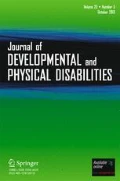Abstract
Behavioral Relaxation Training (BRT), a set of 10 overt postural behaviors taught directly by prompting and performance feedback, was used to establish selfcontrol of hyperventilation and seizures in a profoundly retarded epileptic boy. Additional treatment components included positive reinforcement and fading of prompts. The frequency of hyperventilation episodes, and seizures which directly followed hyperventilation, decreased at home and school by more than 50%. Followup data, collected each of 6 months, indicated maintenance of therapeutic gains. Further, social validation at home, school, and with a neurologist indicated satisfaction with the procedures and outcome. Thus, behavioral relaxation training can be effectively employed with profoundly retarded clients. And reduction of preseizure behavior in an epileptic child can result in the subsequent reduction of seizure activity.
Similar content being viewed by others
References
Cataldo, M. F., Russo, D. C., and Freeman, J. M. (1979). A behavior analysis approach to high-rate myoclonic seizures.J. Aut. Devel. Dis., 9: 413–427.
Dahl, J., Melin, L., and Leissner, P. (1988). Effects of a behavioral intervention on epileptic seizure behavior and paroxysmal activity: A systematic replication of three cases of children with intractable epilepsy.Epilepsia 29: 172–183.
Dahl, J., Melin, L., and Lund, L. (1987). Effects of a contingent relaxation treatment program on adults with refractory epileptic seizures.Epilepsia 28: 125–132.
Harvey, J. R., Karan, O. C., Bhargava, D. and Morehouse, N. (1978). Relaxation training and cognitive behavioral procedures to reduce violent temper outbursts in a moderately retarded woman.J. Behav. Ther. Exp. Psychiatry 9: 347–351.
Katz, R. C. and Zlutnick, S. (1975).Behavior Therapy and Health Care, Pergamon Press, New York, pp. 317–341.
Lewis, B. I. (1954). Chronic Hyperventilation Syndrome.J. Am. Med. Assoc., 155: 1204–1208.
Livingston, S. (1954).The Diagnosis and Treatment of Convulsive Disorders in Children. Charles C. Thomas, Springfield, Ill.
Lutzker, J. R. (1990). Damn it, Borris, I'm not a product of Walden Two, or who's controlling the controllers. In Singh, N., and Repp, A. (eds.),Severe Behavior Problems in Developmental Disabilities: Issues in Nonaversive Therapy.
Lutzker, J. R., Campbell, R. V., Newman, M. R., and Harrold, M. (1988). Ecobehavioral interventions for abusive, neglectful and high-risk families.Supp. Caregiving Fam. 20: 313–326.
Mayhew, G. L. and Harris, F. C. (1978). Some negative side effects of a punishment procedure for stereotyped behavior.J. Behav. Ther. Exp. Psychiatry 9: 245–251.
Melin, L. and Dahl, M. A. (1981). Effects of contingent relaxation on epileptic seizures.J. Psychiatric Treat. Eval. 3: 201–207.
Riley, T. L. (1982). Epilepsy—or merely hyperventilation?Emerg. Med. 14: 162–167.
Schilling, D. J. and Poppen, R. (1983). Behavioral relaxation training and assessment.J. Behav. Ther. Exp. Psychiatry 14(2): 99–107.
Singh, N. N., Dawson, M. J., and Gregory, P. R. (1980). Supression of chronic hyperventilation using response-contingent aromatic ammonia.Behavior Therapy (Sept.) Vol. II (4), pp. 561–566, Katz, R. C., and Zlutnick, S. (eds.) (1975).Behavior Therapy and Health Care, Pergamon Press, New York, pp. 317–341.
Author information
Authors and Affiliations
Rights and permissions
About this article
Cite this article
Kiesel, K.B., Lutzker, J.R. & Campbell, R.V. Behavioral Relaxation Training to reduce hyperventilation and seizures in a profoundly retarded epileptic child. Journal of the Multihandicapped Person 2, 179–190 (1989). https://doi.org/10.1007/BF01100089
Issue Date:
DOI: https://doi.org/10.1007/BF01100089




